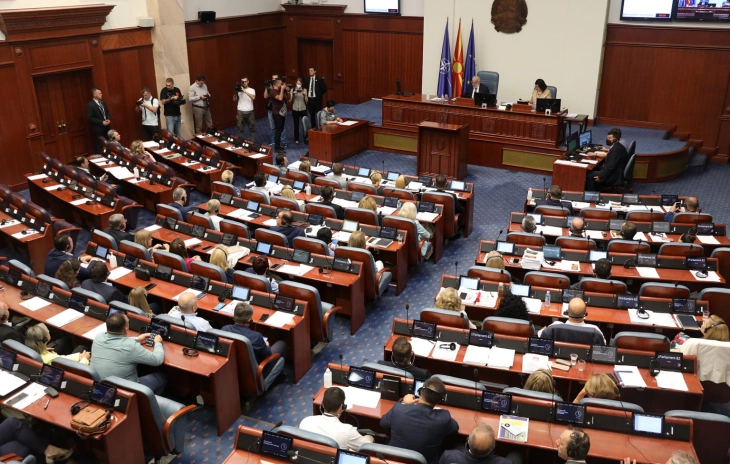EC Report: Negotiation process requires broad consensus of major political parties
- North Macedonia’s EU accession negotiation process requires broad consensus of major political parties. All parties need to start engaging in a constructive and inclusive political debate, to strengthen the role of Parliament, notes the European Commission’s 2023 Report on North Macedonia, in the section on political criteria.
- Post By Angel Dimoski
- 14:22, 8 November, 2023

Brussels, 8 November 2023 (MIA) – North Macedonia’s EU accession negotiation process requires broad consensus of major political parties. All parties need to start engaging in a constructive and inclusive political debate, to strengthen the role of Parliament, notes the European Commission’s 2023 Report on North Macedonia, in the section on political criteria.
“Parliament and government committed to launch and achieve as a matter of priority the relevant constitutional changes, with a view to including in the Constitution citizens who live within the borders of the state and who are part of other peoples, such as Bulgarians,” says the document which notes that North Macedonia continued its efforts to strengthen democracy, while it faced significant challenges in the area of the rule of law.
The EC assessed that Parliament’s work was marred by political polarization, which deepened further, delaying the adoption of many reform laws and important appointments
“Excessive and sometimes inappropriate use was made of fast-track procedures and of the ‘EU flag’ procedure, in some cases due to the lack of consultations and poor planning of the legislative calendar. The ‘EU flag’ should be used when directly linked to the adoption of laws whose main goal is aligning with the EU acquis, and not to short-cut public debate on important issues,” stresses the Report.
According to the EC, parties should spare no efforts in meeting long-overdue commitments for internal reform dating from the third round of the ‘Jean Monnet Dialogue’ in early 2020. It also notes the importance of a prompt implementation of recommendations by the Group of States against Corruption in order to increase the transparency of funding for political parties.
The Report also highlights the need for Parliament to ensure a timely review of statutory reports sent to it by state agencies and bodies, as well as the need to strengthen the capacity for parliamentary oversight of the intelligence services.
The Commission notes that no progress has been made to implement the recommendations made by OSCE/ODIHR and the Venice Commission in terms of electoral legislation.
“Overall, the legal framework remains conducive to the holding of democratic elections in North Macedonia. However, no progress was made to address and implement the outstanding recommendations by the OSCE's Office for Democratic Institutions and Human Rights and the Venice Commission. As mentioned repeatedly in previous reports, electoral legislation should be comprehensively reviewed to address inconsistencies in a timely, inclusive and transparent manner,” adds the document.
According to the EC, North Macedonia remains moderately prepared in terms of public administration reform. It notes that limited progress was made in the reporting period with the adoption of the new public administration reform strategy and the accompanying action plan in July 2023.
“Despite having started the process five years ago, the country still has not adopted the revised legislative framework for human resources management, which includes the revised Law on administrative servants, the Law on public sector employees and new legal provisions on top level management. The new framework should improve human resource management across the administration and help ensure merit-based recruitments, promotions, and dismissals at all levels, including senior management. Legislation has not yet taken on board the State Commission for the Prevention of Corruption’s recommendations on nepotism, cronyism, and political influence in the recruitment of public sector employees and in the appointment of members of supervisory and management boards. Improvements in accountability in the public administration are undermined by the failure to adopt the new Law on state organisation. There are ongoing efforts to improve delivery of services to citizens and businesses,” notes the EC.
The Report notes that the civil society organizations (CSOs) in the country continue to operate in an enabling environment, however, it adds, “the government should increase its efforts to mainstream civil society engagement in priority areas and consultation activities”. According to the EC, CSOs should play an important role in the reform process and be involved in decision-making processes.
Photo: MIA Archive







